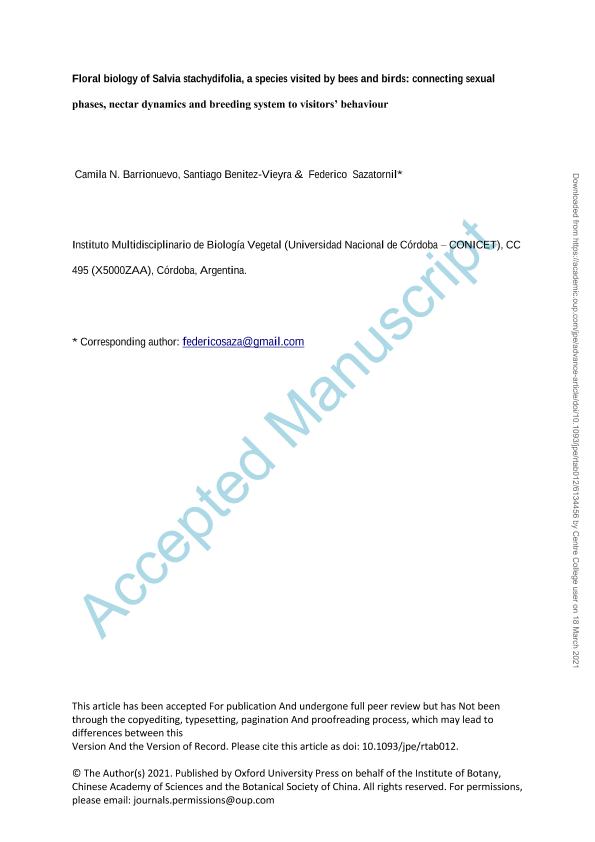Mostrar el registro sencillo del ítem
dc.contributor.author
Barrionuevo, Camila Nerea

dc.contributor.author
Benitez-Vieyra, Santiago Miguel

dc.contributor.author
Sazatornil, Federico David

dc.date.available
2021-07-13T11:29:11Z
dc.date.issued
2021-08
dc.identifier.citation
Barrionuevo, Camila Nerea; Benitez-Vieyra, Santiago Miguel; Sazatornil, Federico David; Floral biology of Salvia stachydifolia, a species visited by bees and birds: Connecting sexual phases, nectar dynamics and breeding system to visitors' behaviour; Oxford University Press; Journal of Plant Ecology-uk; 14; 4; 8-2021; 580-590
dc.identifier.issn
1752-9921
dc.identifier.uri
http://hdl.handle.net/11336/135909
dc.description.abstract
Adaptive convergence in floral phenotype among plants sharing a pollinator guild has been acknowledged in the concept of pollination syndrome. However, many plants display traits associated with a given syndrome, but are visited by multiple pollinators. This situation may indicate the beginning of a pollinator shift or may result in a stable situation with adaptations to different pollinators. In Salvia stachydifolia, a previous study suggested that flower shape is optimized to maximize the contribution to pollination of bees and hummingbirds. Here, we studied three additional aspects of its floral biology: sexual phases, nectar dynamics and breeding system, and examined their connection with pollinators' behaviour to explore the presence of adaptations to bee and/or hummingbird pollination. Methods: Using a greenhouse population, we applied five pollination treatments to characterize breeding system. To determine sexual phases, we recorded flower opening, anther dehiscence, corolla fall and stigma receptivity. Additionally, we characterized nectar volume and concentration dynamics along the day. Finally, to determine pollinator assemblage and visitation patterns, we performed field observations and recorded pollinators' behaviour. Important Findings: Salvia stachydifolia was partially protandrous and self-compatible, but open-pollinated plants attained the highest reproductive success, suggesting that reproduction is mainly dependent on pollinator activity. Bombus opifex bumblebees were the most frequent visitors, but Sappho sparganura hummingbirds dominated visits early in the morning and at dusk. Nectar was typical of bumblebee pollination. We suggest that the bee-hummingbird mixed visitation constitutes an unstable evolutionary situation, making S. stachydifolia an ideal system to understand the ecological circumstances in which pollination shifts occur.
dc.format
application/pdf
dc.language.iso
eng
dc.publisher
Oxford University Press
dc.rights
info:eu-repo/semantics/openAccess
dc.rights.uri
https://creativecommons.org/licenses/by-nc-sa/2.5/ar/
dc.subject
BREEDING SYSTEM
dc.subject
NECTAR DYNAMICS
dc.subject
POLLINATOR BEHAVIOUR
dc.subject
SALVIA
dc.subject
SEXUAL PHASES
dc.subject.classification
Biología

dc.subject.classification
Ciencias Biológicas

dc.subject.classification
CIENCIAS NATURALES Y EXACTAS

dc.title
Floral biology of Salvia stachydifolia, a species visited by bees and birds: Connecting sexual phases, nectar dynamics and breeding system to visitors' behaviour
dc.type
info:eu-repo/semantics/article
dc.type
info:ar-repo/semantics/artículo
dc.type
info:eu-repo/semantics/publishedVersion
dc.date.updated
2021-07-12T13:16:29Z
dc.identifier.eissn
1752-993X
dc.journal.volume
14
dc.journal.number
4
dc.journal.pagination
580-590
dc.journal.pais
Reino Unido

dc.journal.ciudad
Oxford
dc.description.fil
Fil: Barrionuevo, Camila Nerea. Universidad Nacional de Córdoba. Facultad de Medicina. Departamento de Fisiología Humana y Física Biomedica. Cátedra de Física Biomedica; Argentina. Consejo Nacional de Investigaciones Científicas y Técnicas; Argentina
dc.description.fil
Fil: Benitez-Vieyra, Santiago Miguel. Consejo Nacional de Investigaciones Científicas y Técnicas. Centro Científico Tecnológico Conicet - Córdoba. Instituto Multidisciplinario de Biología Vegetal. Universidad Nacional de Córdoba. Facultad de Ciencias Exactas Físicas y Naturales. Instituto Multidisciplinario de Biología Vegetal; Argentina
dc.description.fil
Fil: Sazatornil, Federico David. Consejo Nacional de Investigaciones Científicas y Técnicas. Centro Científico Tecnológico Conicet - Córdoba. Instituto Multidisciplinario de Biología Vegetal. Universidad Nacional de Córdoba. Facultad de Ciencias Exactas Físicas y Naturales. Instituto Multidisciplinario de Biología Vegetal; Argentina
dc.journal.title
Journal of Plant Ecology-uk

dc.relation.alternativeid
info:eu-repo/semantics/altIdentifier/url/https://academic.oup.com/jpe/advance-article/doi/10.1093/jpe/rtab012/6134456
dc.relation.alternativeid
info:eu-repo/semantics/altIdentifier/doi/http://dx.doi.org/10.1093/jpe/rtab012
Archivos asociados
